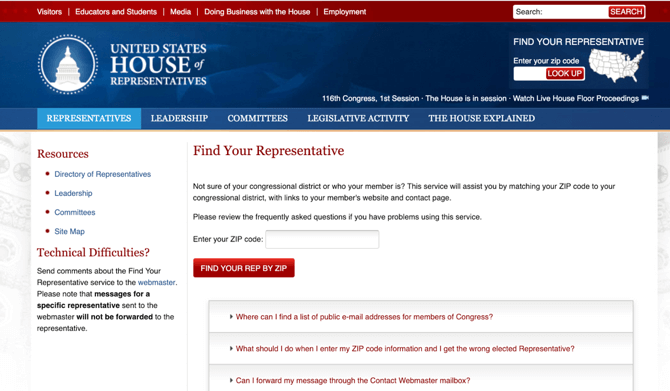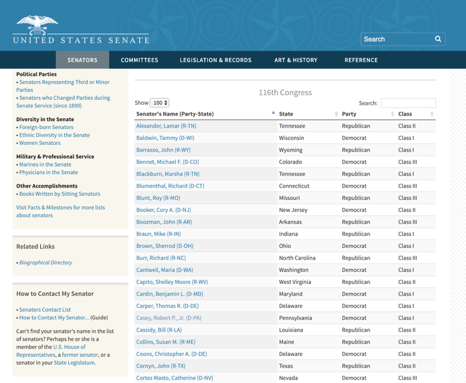One of the easiest ways you can ignite change and improve the lives of people with disabilities is by contacting your elected officials. You can inform them about the issues that are impacting you, your loved ones and your community. You can persuade them to make the right decisions on policies and laws. And, most importantly, you can make a difference.
Legislators keep track of the number of emails and letters they receive on an issue. It helps inform their decision-making. When they receive a lot of input on a particular issue, they have a better understanding of what matters to their constituents.
This post goes over everything you need to know about contacting your elected officials, from finding their contact info to what to say and how to say it.
How to Find Contact Info for Your Elected Officials
Thanks to today’s technology, finding contact info for your elected officials is easy.
United States House of Representatives

Find contact info for your U.S. Representative
Click the link above, enter your zip code, and you’ll find your U.S. Representative. The result will include your U.S. Representative’s website, where you can find their contact information.
United States Senate

Find contact info for your two U.S. Senators
Click the link above and scroll to the bottom of the page where it lists all Senator’s names. By clicking on the state column header, you can sort the list alphabetically by state.
Find your state on the list, and you’ll see your two Senators. Their names will link to their website, where you can find their contact information.
Your State’s Governor

Find contact info for your Governor
Click the link above and use the dropdown menu to select your state or territory. When you make your selection, you’ll automatically go to your Governor’s website. On their website, you can find their contact information.
Your State’s Legislators

Find contact info for your state’s House of Representative members or Senators
Click the link above, then click on your state or territory, and you’ll be sent to your state’s legislation website. You can find contact info for your legislators, often using a link that allows you to search by your address.
What to Say

When you contact your elected official, write them in a clear and concise way. You’ll want to:
- Keep your letter or email short and to the point
- Use proper grammar
- Urge but don’t make demands
Our elected officials can receive many emails, faxes and letters. While they may not be able to read every word of every letter, their staff can skim letters quickly to find out what matters most to their constituents.
By writing clearly and concisely, their staff can easily find your position — and your voice is heard.
Writing a Letter to Your Representative or Member of Congress

When writing a letter, include the key points:
- The name of the law or policy, bill number, or a description of the problem
- What you want your representative to do about this
- Why it affects you — who you are
- Why it’s important for everyone
Using a Template Letter to Contact Your Elected Official
If you are writing about a proposed bill, you can use the template below. You can also adjust the letter template to match a letter requesting more funding or bringing a problem to your elected official’s attention.
While the template below is a great start to your letter, the most impactful letters include personal stories that highlight the issue. Try to include details on how the issue is affecting you and other constituents at the local level.
A Letter Template
<Date>
The Honorable <Elected official’s full name>
<Elected official’s address>
Dear Representative/Senator <Last Name>
I am writing to urge you to <support, not support or amend> <law or policy name or bill number>. This is important to me because I am a <describe your role>. The issue directly impacts me because <explain how you or your loved ones are impacted>.
<Write more about how this law or policy will affect other constituents. Include supporting points to back up your position. If possible, include a story that shows how local people are impacted.>
Thank you for your time and consideration of my viewpoint. Please make <name of the problem> a higher priority for our nation by <amending, passing or failing> <law or policy name or bill number>.
I look forward to hearing your stance on the issue.
Sincerely,
<Your full name>
<Address>
<Phone Number>
<Email Address>
Benefits of Sending a Letter
Compared to sending an email, there are two benefits of sending a letter:
- You can prove you are a constituent — Your letter will be postmarked, proving you are an actual constituent and live in your legislator’s district.
- Your letter will stand out — Since most people use email to contact their elected official, your hardcopy letter will stand out. If you can get others to write letters too, they can have an even greater impact.
Writing an Email

Sending an email is the quickest way to reach your elected official. The downside is they receive many emails.
To make your email stand out, use a concise subject line, such as “Please support <bill or policy name>.”
In the body of the email, make it easy to scan:
- Use bullet points for key ideas
- Break up the text into short paragraphs, about two to four sentences per paragraph
- Bold only the most important content
What’s the Best Way to Contact an Elected Official? Email, Fax or Mail?

What’s the best way to contact your elected official? It depends on how much time you have to give. If you only have a few moments to share your stance on an issue, sending an email is better than not reaching out at all. If you have more time, send a letter.
At MyCIL, one of our core services as a Center for Independent Living is advocacy. Together, we can effect change in the world and improve the lives of people with disabilities. Learn more about how MyCIL is working to help people like you live their best lives through our advocacy efforts.





